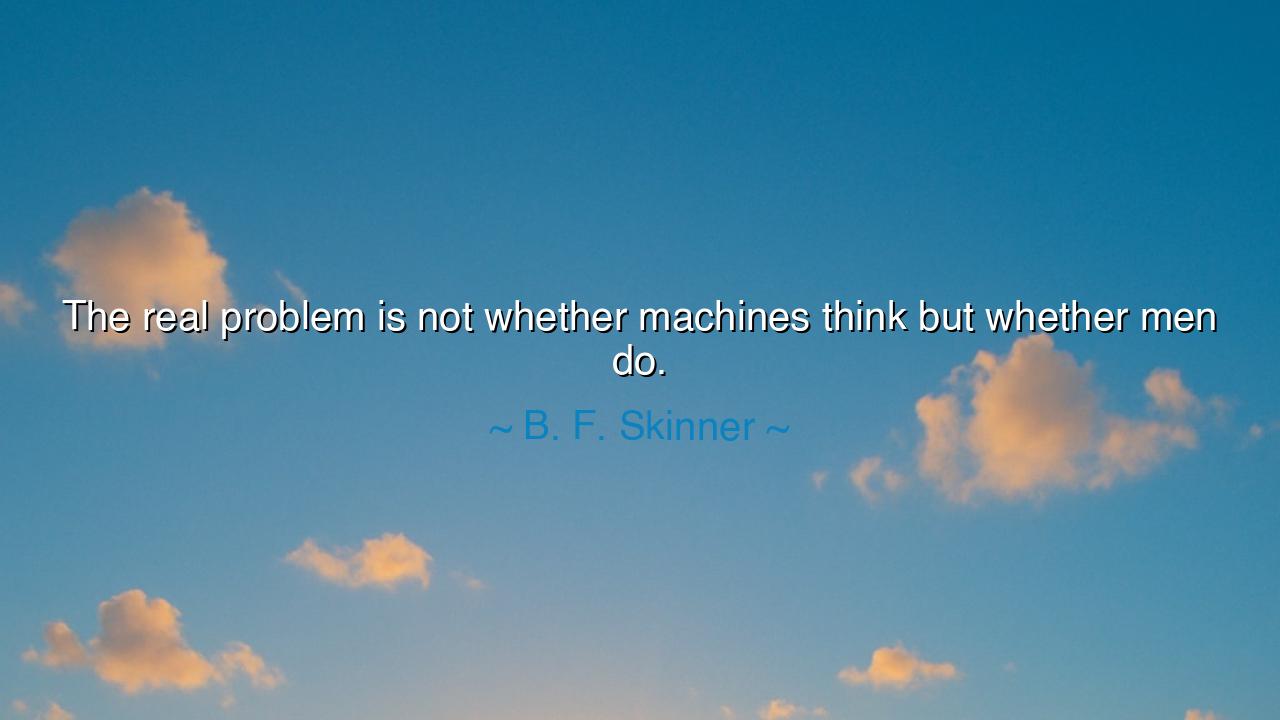
The real problem is not whether machines think but whether men






"The real problem is not whether machines think but whether men do." — these words spoken by B.F. Skinner strike to the heart of a timeless truth. The greatest challenge of the modern age is not the creation of intelligent machines, but the question of whether we, as humans, continue to engage our own minds with the depth of thought and reflection that defines us as a species. Skinner, a renowned behaviorist and philosopher, understood that the true measure of humanity is not our ability to create machines that can replicate human functions, but whether we retain the capacity for critical thinking, introspection, and the deliberate use of our minds.
In the ancient world, the power of human thought was revered. Socrates, the great philosopher of Athens, was famous for his method of questioning, of urging others to think deeply and critically about the world around them. He believed that the key to wisdom lay in the examination of one’s life, in engaging with questions not just for answers but for the very purpose of understanding the deeper truths of existence. Plato, Socrates' disciple, expanded this idea in his dialogues, where the quest for truth was not merely an intellectual exercise, but a way of shaping the soul. In these teachings, the ability to think critically was seen not only as an intellectual virtue but as an essential part of human flourishing.
Yet, as the centuries passed, the rise of technology and machines began to shift the balance. In the ancient world, human minds were the principal tools for discovery, creation, and reflection. The construction of the Great Pyramids, the philosophy of Aristotle, and the epic poems of Homer were all products of human intellect. However, as technology evolved, machines began to perform tasks that once required the thoughtful hands of humans. In Skinner’s time, the rise of automation and the increasing dependence on technology raised a profound question: if machines could think, or at least perform tasks with precision, what would become of the human mind?
Skinner’s words resonate deeply when we consider the tale of Leonardo da Vinci, the great polymath of the Renaissance, who saw no divide between science, art, and invention. Leonardo not only created masterpieces of painting, such as the Mona Lisa, but also designed early versions of machines that would not come to fruition until centuries later. In his inventions, Leonardo demonstrated the pinnacle of human creativity and thought—a mind fully engaged in the exploration of the world’s mysteries. His ingenious designs, though never built in his lifetime, were rooted in the idea that human potential is limitless when paired with the power of thought. Leonardo’s mind was the very embodiment of Skinner’s vision: a mind engaged in the act of creation and reflection.
However, in the present day, automation and artificial intelligence often raise the concern that, as machines take over tasks once performed by humans, we may lose our ability to think critically. Consider the growing reliance on computers, smartphones, and even artificial intelligence to make decisions in our daily lives. These devices, though wondrous in their own right, can also lull us into a state of mental complacency, where we rely on machines to do the thinking for us. Skinner’s cautionary words serve as a reminder that the true problem lies not in the development of machines, but in how we, as humans, might become passive participants in our own lives, allowing technology to perform tasks of the mind that should be our responsibility.
A striking example of this can be found in the realm of education. In modern classrooms, technology is often used to streamline the learning process, providing students with information at the touch of a button. While this access to knowledge is invaluable, there is a growing concern that this immediacy of information may diminish the ability to think deeply, to question, and to reflect. The tools of knowledge are all around us, but they must be wielded with a purpose. Just as a hammer can build a house, it can also destroy if used carelessly. The mind must remain active, engaged, and thoughtful if we are to avoid becoming mere users of technology, rather than creators and thinkers in our own right.
Skinner’s words also call upon us to cultivate our capacity for deep thought, even in the face of increasing automation. To truly live with intention and purpose, we must engage our minds in the act of reflection, discovery, and innovation. Let us not become passive, letting machines do the thinking for us, but rather continue to challenge ourselves, to question, to learn, and to grow. The true potential of humanity lies not in our ability to create machines, but in our ability to think critically, to engage with the world with curiosity, and to maintain our role as the conscious creators of our future.
The lesson here is clear: as machines evolve, so too must our commitment to mental engagement. We must not allow the increasing presence of automation to dull our intellectual faculties. Instead, we must prioritize critical thinking, creativity, and the pursuit of wisdom, ensuring that reasoning remains the hallmark of humanity. As we look to the future, let us honor the ancient teachings of Socrates and Leonardo da Vinci, who reminded us that the true power of the mind lies in its engagement with the world. We are not merely consumers of information, but architects of our own destiny—let us think, create, and reflect, for it is in these acts that we continue to fulfill the highest potential of our human spirit.






AAdministratorAdministrator
Welcome, honored guests. Please leave a comment, we will respond soon